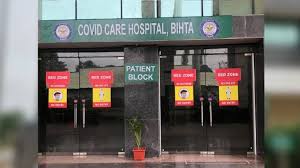 15-02-2021
15-02-2021
Twists in COVID-19 cover: Here’s why your insurer can no longer deny, delay hospitalisation claims

 Insurance Alertss
Insurance AlertssTwists in COVID-19 cover: Here’s why your insurer can no longer deny, delay hospitalisation claims
Mahesh Panigrahi*, a 42-year-old software professional from Delhi, was diagnosed with COVID-19 in the first week of February 2021.
While he has a health insurance policy, his biggest worry was whether his insurer would pay the entire hospitalisation bill or not. Thanks to a timely move by the Insurance Regulatory and Development Authority of India (IRDAI), Panigrahi got the full bill of Rs 3.9 lakh paid by his insurer for the one-week hospitalisation.
Inadequate payment of hospitalisation bill by insurers is one of the biggest worries customers face during the pandemic. IRDAI has now told general insurers through their industry body, the General Insurance (GI) Council, that COVID-19 claims should not be delayed, even if hospitals are not following standard rates.
This means that customers need not worry about whether their reimbursements or medical claims will be borne by the insurers or not. Insurers, on the other hand, will have to renegotiate rates and package deals with hospitals. Standard rates are fixed rates set for COVID-19 treatment across India. However, as reported by Moneycontrol earlier, many hospitals have not been following this rate, leading to friction between the insurers and medical institutions.
The IRDAI decision is beneficial to customers, though insurers would still have to struggle with high claim ratios. High claim ratios mean that an insurer’s losses would exceed 100 percent. In simple terms, this means that for every Rs 100 collected as premium, the insurer will pay Rs 101 or more as claims. This would lead to a price increase in health policies during renewal. COVID-19-related health insurance claims worth close to Rs 6,650 crore have been settled by insurers till the first week of February. So far, hospitalisation claims worth about Rs 13,100 crore have been filed. The absolute number of claims, as of February 6, is 870,000.
What has the regulator told insurers
The regulator has said that non-life insurers can use the reference rates of the GI Council as the standard metric for claims settlement.
In case of high claims, it has been said that the policyholder should not suffer and that it should be the responsibility of the insurer to settle the claims quickly. This move assumes significance because policyholders have been hit with high medical expenses for COVID-19 treatment, especially with infection-control costs being added to the bill.
“Customers stand to benefit, but it is unfair on us because hospitals are at fault. We will pay the claims as advised but shouldn’t hospitals be penalised for not following rules,” asked the head of underwriting at a private insurer. This official also added that many hospitals are exceeding the package rate and the final payment burden is on the insurers.
For instance, the GI Council rate card says that the cost at National Accreditation Board for Hospitals & Healthcare Providers-accredited (NABH) hospitals will be Rs 10,000 per day, including PPE cost (Personal Protection Equipment) of Rs 1,200. In the case of non-NABH hospitals, this will be Rs 8,000 per day. For severely sick patients, who need intensive care unit (ICU) with ventilator care, hospital rates per day will be Rs 18,000 (Rs 15,000 at non-NABH hospitals), including PPE cost of Rs 2,000.
“The standard rates are hardly being followed. The government should pull up the hospitals and force them to follow these rates. We will pay bills as instructed but customers may be hit with 10-15 percent higher premiums when the policy is renewed,” said the senior vice-president at a state-owned insurer. There are some caveats to the payments. One is that the room-rent limit (for example, Rs 1,500-2,000 per day) will be strictly followed for claims payment if the insured has opted for it. Secondly, home-based care will not be covered under traditional hospitalisation medical insurance. So, if a customer has contracted COVID-19 and is only advised recovery at home, any expenses related to PPE kits or medicines at home will not be payable under a standard health insurance plan, if it only covers hospitalisation (minimum 24 hours).
Why is this crucial for customers?
Traditionally, there has been a trend of hospitals charging customers a higher amount, especially if they have health cover. During the pandemic, too, this scenario played out all across India, when several thousand people started getting admitted to hospitals from April 2020 onwards.
Hospitals faced the challenge of how to manage costs at a time when elective surgeries were being postponed due to the virus outbreak. While insurance claims were being paid only partly, hospitals continued to add newer charges such as temperature check fee, PPE kit fee and cleaning fee. In fact, the GI Council had also planned to file an appeal in the Supreme Court against overcharging by hospitals but this matter wasn’t taken up.
Insurance works on a pool concept. So whatever money is collected as a premium is paid out as claim. If in a year the claim paid out exceeds the premium collected, the excess amount is passed on to customers in the next year in the form of a premium hike. Customers also pointed out that some hospitals resorted to selective charging. Malini Saraogi*, a 34-year-old artist from Kolkata, told Moneycontrol that while she was charged for masks and PPE kits, two other people sharing her room were not.
“I found out that they did not have any health policy while I did. My insurer did not pay the excess charges amounting to Rs 18,000. It would have been good if insurers were asked to pay all such claims in the initial stage itself,” suggested Saraogi, who underwent COVID-19 treatment in October 2020.
However, her neighbour Nisha Rebello* has been lucky. The 57-year-old teacher was hospitalised due to COVID-19 about two weeks ago and has been assured of full payment under the reimbursement policy.
Source: Money Control
